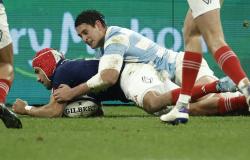Jasmine Murrell and her husband Kevin Orcel ran their first marathon as a couple in New York this weekend. Both visually impaired, they were able to accomplish this feat thanks to the support of their guides. A challenge full of good “vibrations”!
By Thomas Urban
At the start of the New York marathon on November 3, 2024, Jasmine Murrell, blind, did not see the line of Manhattan skyscrapers or the rows of cheering spectators but she was able to feel the “vibrations” of this race out of the norm…
The first marathon as a couple
Jasmine’s husband, Kevin Orcel, who suffers from less advanced glaucoma than his wife’s, also at the start, did not have many illusions. “After two or three kilometers, it will take off,” joked the thirty-year-old ahead of the race. Unlike his partner, he was experiencing his first marathon, after 12 half-marathons. Coming from New Jersey, Jasmine and Kevin were able to count on the support of two guides from the Achilles international association, the world’s largest organization supporting people with disabilities in endurance races.
Establish a connection with your guide
One of Jasmine’s two guides has been training with her for a long time. “It’s important to have that connection, she said. He already knows what to announce and what is the best way to communicate.” Jasmine, mother of a young boy named Elijah, can see shadows and shapes out of her right eye, but nothing in her left. Kevin counted on his accompanists to depict a little of the surrounding madness. “I tell them: ‘Read me the signs’. There are quite a few that are funny and they can also motivate you.” “For me, it’s the vibes of the crowd, the encouragement and all that noise,” explains Jasmine. “I convert that into stimulation, so I’m also able to get that rush of adrenaline and excitement.”
“Report funny signs, costumes”
“I always ask (runners’) preferences before,” says Tianna Biscone, Achilles volunteer, because, “For some, running is difficult and they prefer to concentrate on that” and limit interactions with their guide. But, for competitors who are willing to talk, she says, “it’s really nice, especially during a marathon”, to report “the fun panels, the costumes, to help them experience it in a different way.”
A 1era race towards the unknown “terrifying”
Participating in a mass event that brings together more than 50,000 people when you have limited or no vision is a challenge. “When I did my first jog, I was 22 years old and I had never gone anywhere without my cane,” remembers Francesco Magisano, blind and today director of the New York branch of Achilles. “Running into the unknown was one of the most terrifying things I have ever done,” says the man who has since finished a marathon in 3h30. “It took me a few months of training to get comfortable enough and relax.”
A guide and an attendant placed in front
The classic system includes a guide connected by a cord to its blind rider as well as a second guide placed a few meters in front to point out possible obstacles and remove some of them. “Last year I didn’t realize I was tired until the 40the kilometer”, out of 42, remembers Sarah Luposello, also a volunteer for Achilles. “I was so focused on the course, (…) the ground. Is there a hole? A banana peel lying around? A refueling station?” The Achilles branch in New York is by far the largest in this global network, with around 700 runners and 4,500 volunteers.
A unique duo challenge
“I always end up losing my voice after guiding a marathon, because you’re always talking to your athlete or asking people to move aside, describes Tianna Biscone. That’s why I like it so much. It’s a truly unique challenge that you can’t experience running alone.” If the first sensations of the blind runner are often tinged with nervousness, once the habit is acquired and a relationship established with a guide, the door to fulfillment opens.
“Just fun, nothing to think about”
“As a blind person, crossing the street is probably the most stressful thing you will ever do,” according to Kevin Orcel. “But being able to run on a road knowing that the lane is protected, (…) it’s quite liberating.” “It’s just fun, not having to think about anything, confirme Jasmine Murrell. I just have to run and get to the finish line.”
© Instagram jasmine_murrell
“All reproduction and representation rights reserved.© (2024) Agence France-Presse.All information reproduced on this page is protected by intellectual property rights held by AFP. Consequently, none of this information may be reproduced, modified, rebroadcast, translated, commercially exploited or reused in any way without the prior written consent of AFP. AFP cannot be held responsible for delays, errors, omissions which cannot be excluded, nor for the consequences of actions or transactions carried out on the basis of this information.
- -




